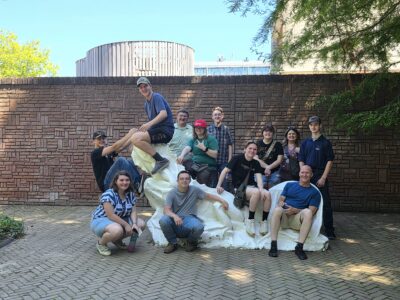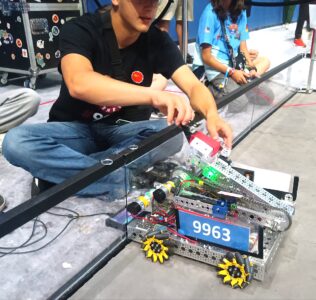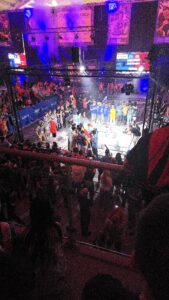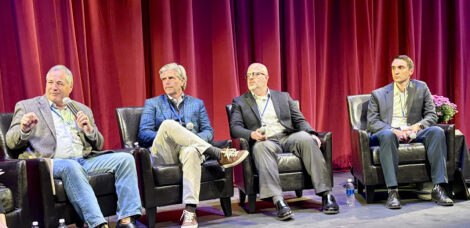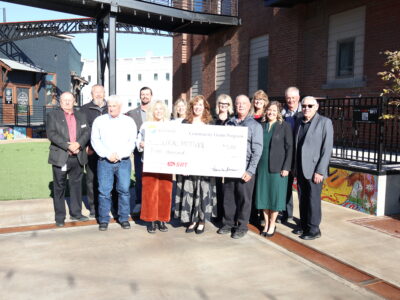Alexander robotics competes internationally
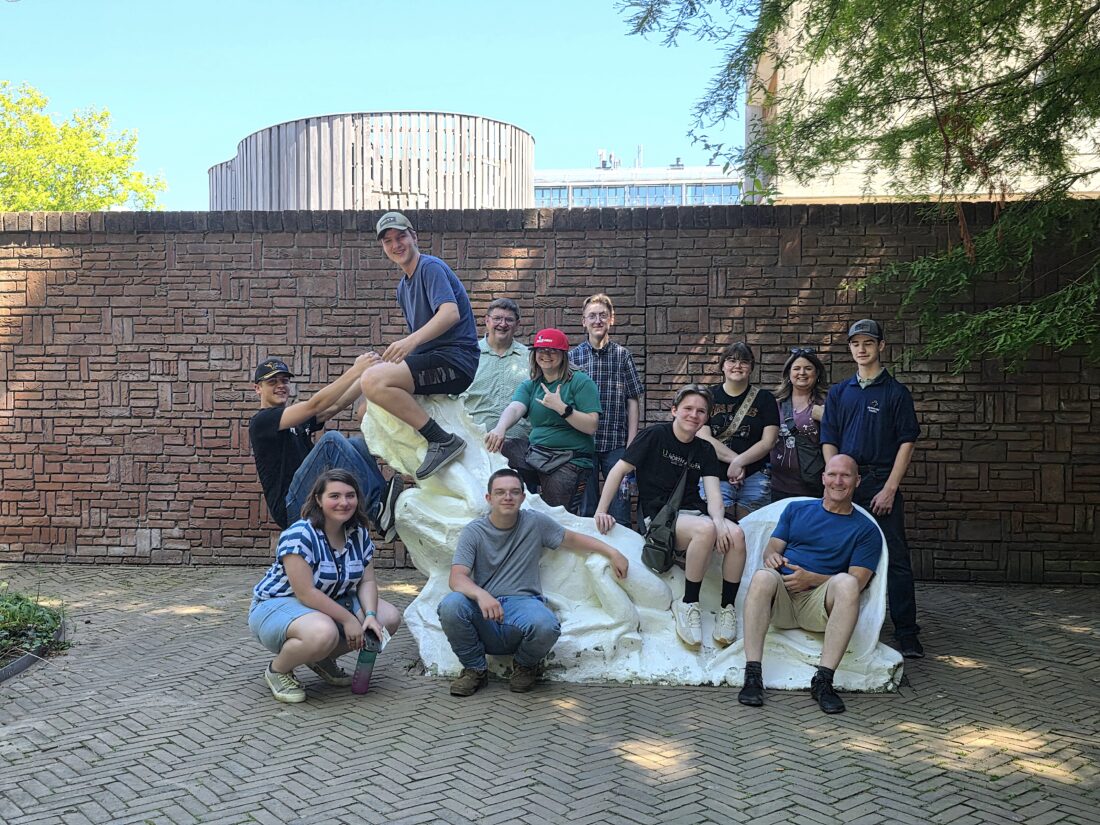
Submitted Photo The Alexander Comets FTC Robotics team members are, back row, from left to right, Garrett Rider, Matthew Kline, Mark Honstein, David McLinden, Ben Honstein, Brooke Rykhus, Cathay White and Ryker Thurman; and front row, Paiten Iverson, Daimeon Sawvell, Ty Womelsdorf and Sheldon Wahlstrom.
ALEXANDER – The Alexander Comets FTC Robotics team enjoyed a great deal of success last school year which culminated with the opportunity to compete at the FIRST Tech Challenge International Premiere competition in the Netherlands in July.
The road to Eindhoven began with a lot of hard work for the students involved in the program, and placing at regional and statewide competitions.
The FIRST Tech Challenge (FTC) is a robotics competition for students in grades 6-12 to compete head to head by designing, building and programming a robot to accomplish set tasks in head-to-head competition with other teams. Once the season’s theme and game are established, students must design, build and program their robot.
“It definitely encourages students to think outside the box, think on their own, think with others, collaboration and communication. That general ability to solve problems, and work as a team to do so,” coach Cathy White said. “It’s not just about the robot, it’s about building the whole mind and being able to use skills that will encourage and beneficial to the students as they grow.”
Additionally, students are tasked with performing outreach to individuals, businesses and organizations in their community to support their appearances in qualifiers, state and international competition. This is done through preparing a portfolio book detailing the team’s journey in the design and programming of their robot, as well as maintaining a website and social media presence for the community to follow their efforts.
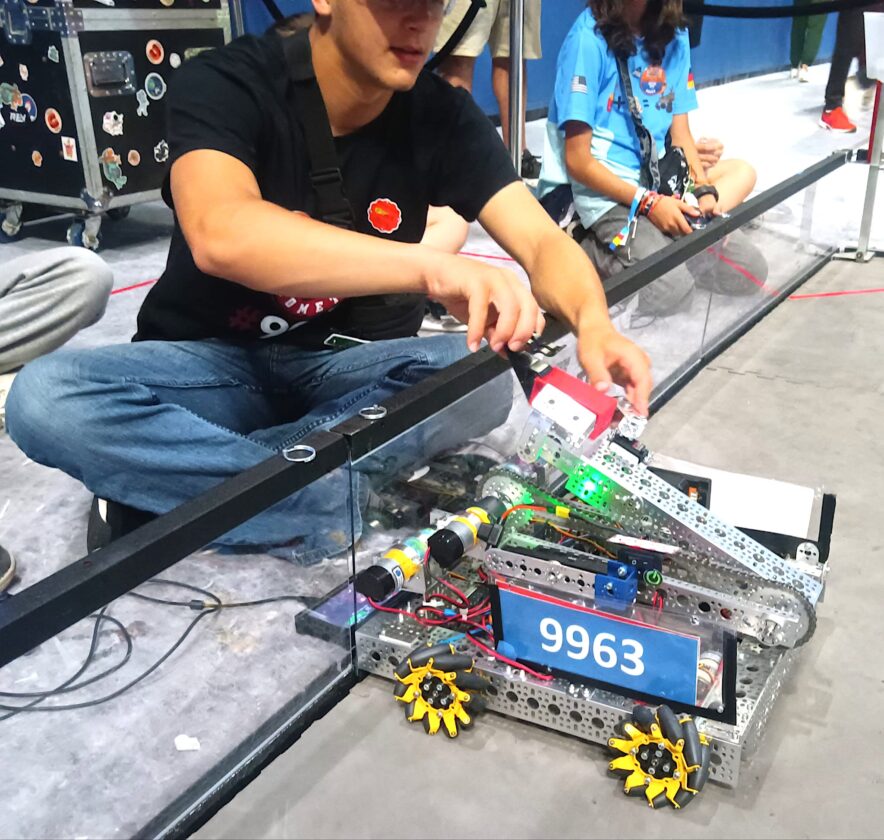
Submitted Photo Garrett Rider makes adjustments to the team’s robot during the competition at the FIRST Tech Challenge International Premiere in Eindhoven, the Netherlands.
“They have to be willing to step outside their comfort zone. They have to be willing to talk to people they don’t know, approach people who are in different types of industry than they are used to, and present their ideas, questions and requests to different companies. There’s just so much they have to do that prepares them to be successful in the workplace,” White said.
Before she began teaching in Alexander 13 years ago, White said she got her first taste of robotics while coaching a FIRST Lego League team in Arizona. White said she was encouraged by the school’s superintendent to start up a program after being introduced to it at a conference.
“So I brought a robotics program into the junior high and high school. A year later I introduced the FTC program to the high schoolers, and its been 10 years now we’ve been an established team,” White said. “In my first year I only had three students on the team. The team has grown in size ever since.”
The theme for the 2024-2025 season was “Into the Deep”, and was concerned with removing plastic from the ocean. While not actually in the water, the objective for their robot was to pick up various plastic blocks and place them into appropriate receptacles.The team’s lead engineer was junior Garrett Rider, who said their robot went through iterations before they settled on the final design.
“It was fairly simple compared to some of the others we saw (in Eindoven). We had two motors attached directly to the chassis of the robot that connected to an arm connected to a chain where it could move the arm, with a claw at the end,” Rider said. “It worked like how your arm would.”
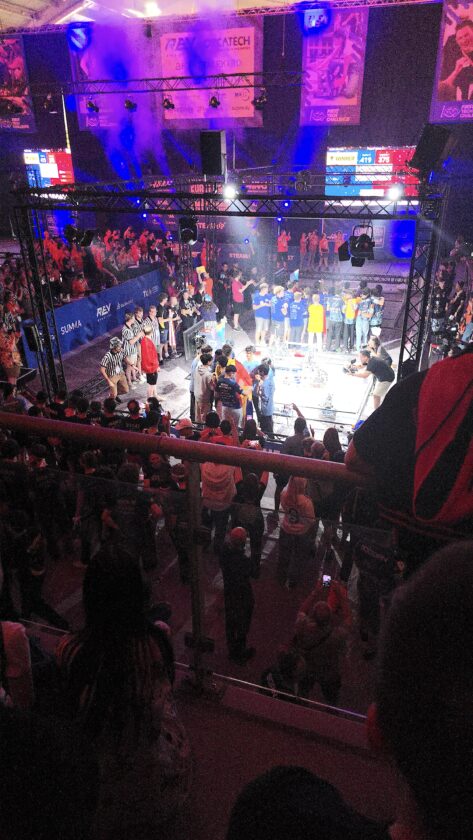
Submitted Photo Participants prepare for the finals at the FIRST Tech Challenge International Premiere competition in the Netherlands.
The Comets FTC team took part in two qualifiers in Tioga and Bismarck during the season to earn a spot at the state competition, where they placed in top three in Team Robot. While initially just missing the cut for an invite to one of the international FTC competitions, White and her team were notified they had the chance to vie for one due to one of the top two teams being unavailable.
“My initial reaction was, ‘holy crap.’ Then it was, what do we have to do to make this work? How do we secure the funds? How do we get enough support from our community to make this a reality,” White said. “It was a crazy time.”
White said she and her students then set to work drafting a letter to potential sponsors, and began contacting local companies and community members. Ultimately, the team readied just under $40,000 in 10 weeks.
Nine students and four adults made their way to Eindhoven by plane, train and bus to join 96 other teams from all over the world. Despite the Comets finishing in the middle of the pack, Rider said the Comets took it in stride and are already looking ahead to next year’s challenge.
“For us, it was kind of like watching an NBA team while we’re just a high school varsity. A lot of the kids were so much smarter and their ideas were so much more complex,” Rider said. “Our robot did struggle against them, and our downfall was the fact we went so much simpler than last year because we were scared of doing something huge and failing. I learned a lot as to what I as an engineering lead to lead the team. The coding team and portfolio and outreach teams I’m sure learned a lot as well.”
Junior David McClinden said he was really impressed by what some of the other teams brought to the table, and enjoyed experiencing the culture of the Netherlands.
“We got to go on a bunch of tours. It was beautiful there. Their drinks were very different from ours,” McClinden said. “The culture is so different from ours. They had a bunch of bike paths, their zoos were very different. I didn’t realize how many people from around the world were into robotics.”
“I am very proud of the team and all they accomplished this year. Even getting the opportunity to go to the Netherlands. That they met teams from all over the world, made friends and acquaintances, and brought back ideas. Just so proud of the fact the team was given the opportunity, took the opportunity, and learned from the opportunity,” White said.
- Submitted Photo The Alexander Comets FTC Robotics team members are, back row, from left to right, Garrett Rider, Matthew Kline, Mark Honstein, David McLinden, Ben Honstein, Brooke Rykhus, Cathay White and Ryker Thurman; and front row, Paiten Iverson, Daimeon Sawvell, Ty Womelsdorf and Sheldon Wahlstrom.
- Submitted Photo Garrett Rider makes adjustments to the team’s robot during the competition at the FIRST Tech Challenge International Premiere in Eindhoven, the Netherlands.
- Submitted Photo Participants prepare for the finals at the FIRST Tech Challenge International Premiere competition in the Netherlands.

